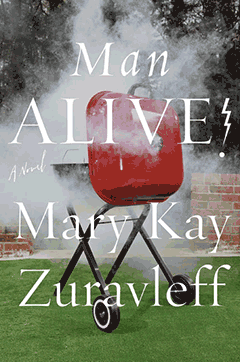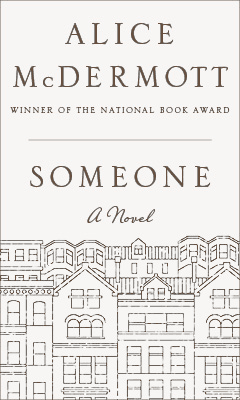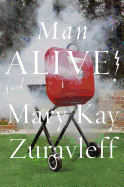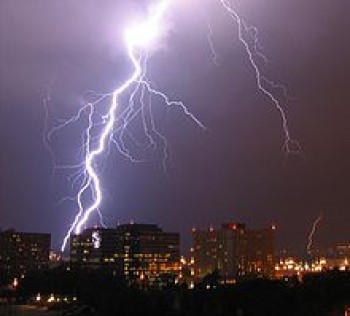Man Alive!
by Mary Kay Zuravleff
It is rare enough to find a novel that combines a compelling story with beautiful writing, but even more unlikely to discover a novelist who can present these elements in as unique a way as Mary Kay Zuravleff has in Man Alive! Zuravleff has taken a familiar situation--a family faced with a crisis--and given it a strikingly original spin while still managing to convey themes that are universal.
One of Zuravleff's many gifts is her ability to set up and shade a scene with both physical and emotional nuance. So when we are first introduced to Owen Lerner and his family on the last day of their Delaware beach vacation, we learn a great deal about their family dynamic simply from observing Owen, a pediatric psychopharmacologist, reach into his pocket for a quarter to put in a parking meter. As he moves to slip the coin in the slot, Owen occupies the space between the past and the future, reflecting on the relationship he has with his wife, Toni, whom he still considers "lovely," and how comfortable it has become. His thoughts alternating between the dinner he's about to have and what medications he'll prescribe for his patients, Owen notices that his 16-year-old daughter, Brooke, seems to have suddenly become a woman and that his twin college-age sons, Will and Ricky, have forged their own identities. Life is good even if peppered with small anxieties. But then Owen feeds the meter and everything changes in one elongated electrified moment. Owen is literally struck by lightning and hurled to the pavement; Ricky dashes over to him and immediately begins CPR. In one of the novel's most elegantly crafted passages (though choosing just one would be impossible in a novel filled with equally lovely passages), Owen's body hovers near death as his life unreels before him. It is a moment of pure understanding for Owen--all of life's mysteries revealed in a flash of ecstatic enlightenment and accompanied, improbably, by the smell of the world's best barbeque.
Though badly burned, Owen survives his injuries (and along the way, Zuravleff provides us with some fascinating details about lightning strikes and their effect on the human body), but his recovery is slow and hampered by his desire to revisit that fleeting moment of ecstasy, which leads him to start acting erratically. But Owen isn't the only Lerner affected by the lightning. In the months following the accident, the entire Lerner family undergoes a sometimes humorous but often very painful transformation as their roles are redefined and their notions of reality are challenged and recalibrated. Moving through the perspectives of all the Lerner family members, Zuravleff displays an almost savant-like insight into the roiling emotions produced in the wake of a brain injury.
Toni takes the first and, initially, the hardest hit as she struggles to understand a husband who is no longer emotionally reliable and who acts, much of the time, like a stranger. Though dedicated to Owen, Toni is uncomfortable in the role of caretaker and can't fathom why Owen insists on chasing down and re-experiencing a moment that almost killed him; she ping-pongs between hope and despair. Teenage Brooke takes her father's new, electrified personality in stride at first, but her mother's anxiety and Owen's flirtation with danger frighten her and when her attempts to get comfort from her brothers fail, she starts looking for love in exactly the wrong place. Perhaps most deeply affected, however, are Owen's sons, although they react in different ways. Will, the "older" of the two, who considers himself closer to his father than his mother, is unsettled (in a way he can't define) that it was Ricky who first came to his father's aid after the lightning strike. Will pulls away from his family, experimenting heavily with drugs and reckless sex until his actions throw the family into another, more public crisis. Wounded by his brother's absence, Ricky attempts to redefine himself with mixed results.
For his part, Owen battles the depression that can follow a traumatic brain injury as well as the adjustment required by his new worldview. The irony that his brain now works in much the same way as his other-wired pediatric patients is not lost on him. In one of the novel's many gently humorous and poignant side plots, Owen attempts to re-create the divine barbeque he smelled when lightning struck him by learning everything there is to know on the subject of fire-roasted meats. He orders tools and befriends butchers and soon constructs a massive fire pit in the family's backyard, where he hosts elaborate, fantastic barbeques.
Their circumstances are highly unusual, but the Lerners and their struggles are recognizable and instantly familiar. It is a credit to Zuravleff's knowledge of the ties that bind and the stresses that break us as family that we feel so strongly about this one. The subtlety and intimacy with which Zuravleff portrays the Lerners would be enough to make Man Alive! a compelling novel but her understanding of and ability to convey the slippery nature of reality and, by extension, what is "normal" lifts it to another level. This is a wonderful and, in many ways, magical novel by a gifted author. --Debra Ginsberg









 One of the themes in the novel is how fine the line is between spiritual ecstasy and insanity. Can you explain how that theme developed for you?
One of the themes in the novel is how fine the line is between spiritual ecstasy and insanity. Can you explain how that theme developed for you?